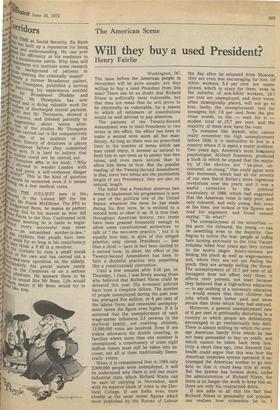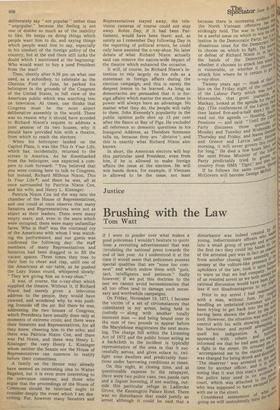The American Scene
Will they buy a used President?
Henry Fairlie
Washington, DC.
The issue before the American people in November will be quite simple: Are they willing to buy a used President from this man? There can be no doubt that Richard • Nixon is politically most vulnerable, but that does not mean that he will prove to be electorally as vulnerable, for a reason to which all reformers of constitutions would be well advised to pay attention. The purpose of the Twenty-Second Amendment was to limit Presidents to two terms in the office; the effect has been to make a second term seem all but mandatory. As long as there was no prescribed limit to the number of terms which one man could enjoy, it seemed as natural to limit him to one term as to permit him two terms, and even more natural than to allow him three or four. But the popular reading of the Twenty-Second Amendment is that, since two terms are the permissible length of any Presidency, they are also its natural length. The belief that a President deserves two terms to implement his programmes is now a part of the political lore of the United States: whatever the mess he has made during his first term, he is entitled to a second term to clear it up. It is true that, throughout American history, two terms have been granted frequently enough to allow some constitutional authorities to talk of "the two-term practice "; but it is equally true that, in spite of this alleged practice, only eleven Presidents — less than a third — have in fact been elected to a second term. In short, the effect of the Twenty-Second Amendment has been to turn a doubtful practice into something like a constitutional convention. Until a few minutes after 9.30 pm, on Thursday, 1 June, I was firmly among those who believed that Richard Nixon could be defeated this year. His economic policies have been a complete failure. The number of people unemployed during the past year has averaged five million, or 6 per cent of the labour force, and concealed unemployment raises the figure even higher. If it is assumed that the unemployment of each wage-earner influences 2.5 persons in the mythical family, not counting children, 12,500,000 votes are involved. Even if one makes allowance for double counting, in families where more than one member is unemployed, a constituency of some eight million voters must still be taken into account, not all of them traditionally Demo cratic voters. When it is remembered that in 1968 only 2,800,000 people were unemployed, it will be understood why there is not one major industrial state which Richard Nixon can be sure of carrying in November, each with its massive block of votes in the Electoral College. If one looks even more closely at the most recent figures which were published by the Bureau of Labour the day after he returned from Moscow, they are even less encouraging for him. Of white workers, 5.3 per cent are unem ployed, which is scary for them, even in the suburbs; of non-white workers, 10.7 per cent are unemployed, and their votes, often strategically placed, will not go to him; lastly, the unemployment rate for teenagers fell 1.6 per cent from the previous month, to the — wait for it — modest total of 15.7 per cent, and the majority of them now have the vote.
To someone like myself, who cannot really remember the high unemployment before 1939, it is instructive to live in a country where it is again a major problem. Two years ago, America's most honoured psephologist, Richard Scammon, produced a book in which he argued that the majority of the electors are " un-poor, uncoloured, un-young." One could agree with this statement, which had all the novelty of our own David Butler's more ingenious revelations over the years; and it was a useful corrective to the political vocabulary of 1968, which had suggested that the American voter is only poor, and only coloured, and only young. But, even at the time, one looked at his figures and read his argument, and found oneself saying: "So what?"
The unemployment Of the minorities — the poor, the coloured, the young — can be unsettling even to the majority. One begins to notice the fear: people at coffee bars turning anxiously to the Jobs Vacant columns when four years ago they turned to the sports pays. Salary-earners are feeling the pinch as well as wage-earners; and, where they are not yet feeling the pinch, they are already feeling the threat. The unemployment of 15.7 per cent of all teenagers does not affect only them; it affects their parents, not least because they believed that a high-school education — to say nothing of a university education — would ensure that their children had jobs which were better paid and more secure than those which they had enjoyed. Moreover, a general unemployment rate of 6 per cent is profoundly disturbing in a country in which people are deliberately encouraged to go contractually into debt. There is almost nothing by which the average American family lives which he has not been persuaded to buy on credit, and which cannot be taken back from him. Only a short time ago, John Kenneth Galbraith could argue that this was how the American corporate system operated: it encouraged the American worker to go into debt so that it could keep him at work. But the system has broken down, under the administration of Richard Nixon, for there is no longer the work to keep him at; there are only his contractual debts.
If one adds to all this the fact that Richard Nixon is personally not popular, one realises how vulnerable he is. I deliberately say "not popular" rather than " unpopular," because the feeling is not one of dislike so much as of the inability to like. He keeps on doing things which people want him to do, and saying things which people want him to say, especially in his conduct of the foreign policy of the country, but at the end there still lurks the doubt which I mentioned at the beginning: Who would want to buy a used President from the man?
Then, shortly after 9.30 pm on what one used, as a schoolboy, to celebrate as the Glorious First of June, he parked his helicopter in the grounds of the Congress of the United States, in full view of the American public which was watching him on television. At times, one thinks that Congress must be the most abject deliberative assembly in the world. There was no reason why it should have acceded to Richard Nixon's request to address a joint session of its two houses, why it should have provided him with a theatre, from which to reach the electors.
When his helicopter landed on the Capitol Plaza, it was like This Is Your Life, which has, incidentally, returned to the screen in America. As he disembarked from the helicopter, one expected a compere to rush forward: " You believed that you were coming here to talk to Congress, but instead, Richard Milhous Nixon, This Is Your Life 0'; and there he was, all at once surrounded by Patricia Nixon Cox, and his wife, and Henry L. Kissinger.
Patricia Nixon Cox led the way into the chamber of the House of Representatives, and one could at once observe that many Senators and Representatives were not as abject as their leaders. There were many empty seats; and, even in the seats which were occupied, there were many unfamiliar faces. Who is that? was the continual cry of the Americans with whom I was watching the performance, and our guess was confirmed the following day: the staff members of many Representatives and Senators had been dragged in to fill the vacant spaces. Three times they rose to their feet to cheer and clap, until one of the Americans at our table, as he pushed the Lazy Susan round, whispered slowly: "They are giving him an o-vay-shun."
It was, of course, the o-vay-shun which supplied the theatre. Without it, if Richard Nixon had merely given a television address to the people, they would have yawned, and wondered why he was pushing Ironside off the air. But there he was, addressing the two houses of Congress, which Presidents have usually done only at moments of extreme crisis; and there were their Senators and Representatives, for all they knew, cheering him to the echo; and there was Patricia Nixon Cox, and there was Pat Nixon, and there was Henry L. Kissinger: the very Henry L. Kissinger whom neither the Senate nor the House of Representatives can summon to testify before their committees.
A family on the throne may already have seemed an interesting idea to Walter Bagehot, but it is even more interesting to the television cameras; and those who argue that the proceedings of the House of Commons should be televised ought to consider deeply the event which I am describing. For, however many Senators and Representatives stayed away, the television cameras of course could not stay away. Robin Day, if it had been Parliament, would have been there; and, as surely as I remember Day following Day in the reporting of political events, he could only have assisted the o-vay-shun. No later debate of what Richard Nixon actually said can remove the nation-wide impact of the theatre which enhanced the occasion.
It will, of course, be Richard Nixon's intention to rely largely on his role as a statesman in foreign affairs during the election campaign; and this is surely the deepest lesson to be learned. As long as democracies are persuaded that it is foreign affairs which matter the most, those in power will always have an advantage. No matter what they do, the people will rally to them. John Kennedy's popularity in the public opinion polls shot up 13 per cent after the fiasco at Bay of Pigs. He excluded all reference to domestic questions in his Inaugural Address, as Theodore Sorensen tells us, because they are ' divisive % and this is exactly what Richard Nixon also knows.
In short, the American electors will buy this particular used President, even from him, if he is allowed to make foreign affairs the issue at the election. He will win hands down, for example, if Vietnam is allowed to be the issue, not least









































 Previous page
Previous page